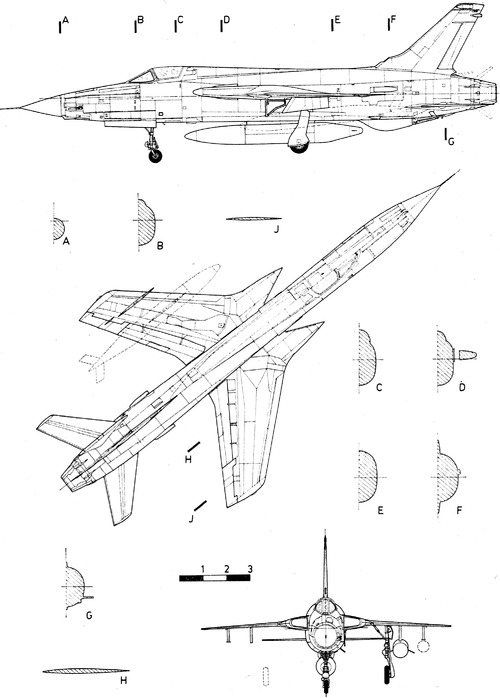The Thunderchief was an incredibly capable aircraft, designed as a supersonic fighter-bomber, penetrating enemy airspace at high-speeds and low-altitudes. It wasn’t, however, built to turn at a great rate—a major necessity in dog fighting
The F-105 all-weather, supersonic fighter-bomber, also known as the “workhorse of Vietnam,” was known for its ability to penetrate enemy defense forces, strike and fly back home at supersonic speeds. The F-105D could carry up to seven tons of bombs—which included nuclear weapons.

Serial Number: 59-1743
Manufacturer: Republic Aviation Corporation
Crew: One
Engines: One Pratt & Whitney J75-P-19W turbojet; 26,500 pounds thrust with afterburner and water injection
Wingspan: 34 feet 11 inches
Length: 64 feet 5 inches
Height: 19 feet 8 inches
Weight: 27,500 pounds (empty); 52,838 pounds (maximum)
Speed: 778 mph (cruising); 1,420 mph (maximum)
Range: 778 miles (combat); 2,208 miles (maximum)
Service Ceiling: 51,000 feet
Armament: One 20mm M61A1 rotary cannon with 1,028 rounds; 14,000 pounds ordnance (up to 8,000 pounds ordnance in internal weapons bay; up to 6,000 pounds ordnance on external racks—four underwing and one centerline)
Cost: $2,140,000 (approximate)
In the 1970s, Hill Air Force Base was responsible for the maintenance and supply of the F-105 aircraft. The F-105D on display was manufactured in 1960 and served on bases in the United States and Thailand. In 1968, the aircraft moved to the 34th Tactical Fighter Squadron where it was renamed “Arkansas Traveler” and flown by Arkansas native Colonel Paul P. Douglas Jr., commander of the 388th Tactical Fighter Wing. In 1981, after the aircraft had logged 4,500 flight hours, it was transported to Hill Air Force Base and restored to the appearance it had as the Arkansas Traveler, for display at Hill Aerospace Museum.
The Thunderchief was an incredibly capable aircraft, designed as a supersonic fighter-bomber, penetrating enemy airspace at high-speeds and low-altitudes. It wasn’t, however, built to turn at a great rate—a major necessity in dog fighting
The nickname was inspired by a popular television character at the time, Howdy Doody’s “Chief Thunderthud.”
As the primary attack aircraft of the Vietnam War, the Thunderchief accounted for 20,000 sorties. Ultimately 382 aircraft were lost, though 61 of those were lost to operational accidents.